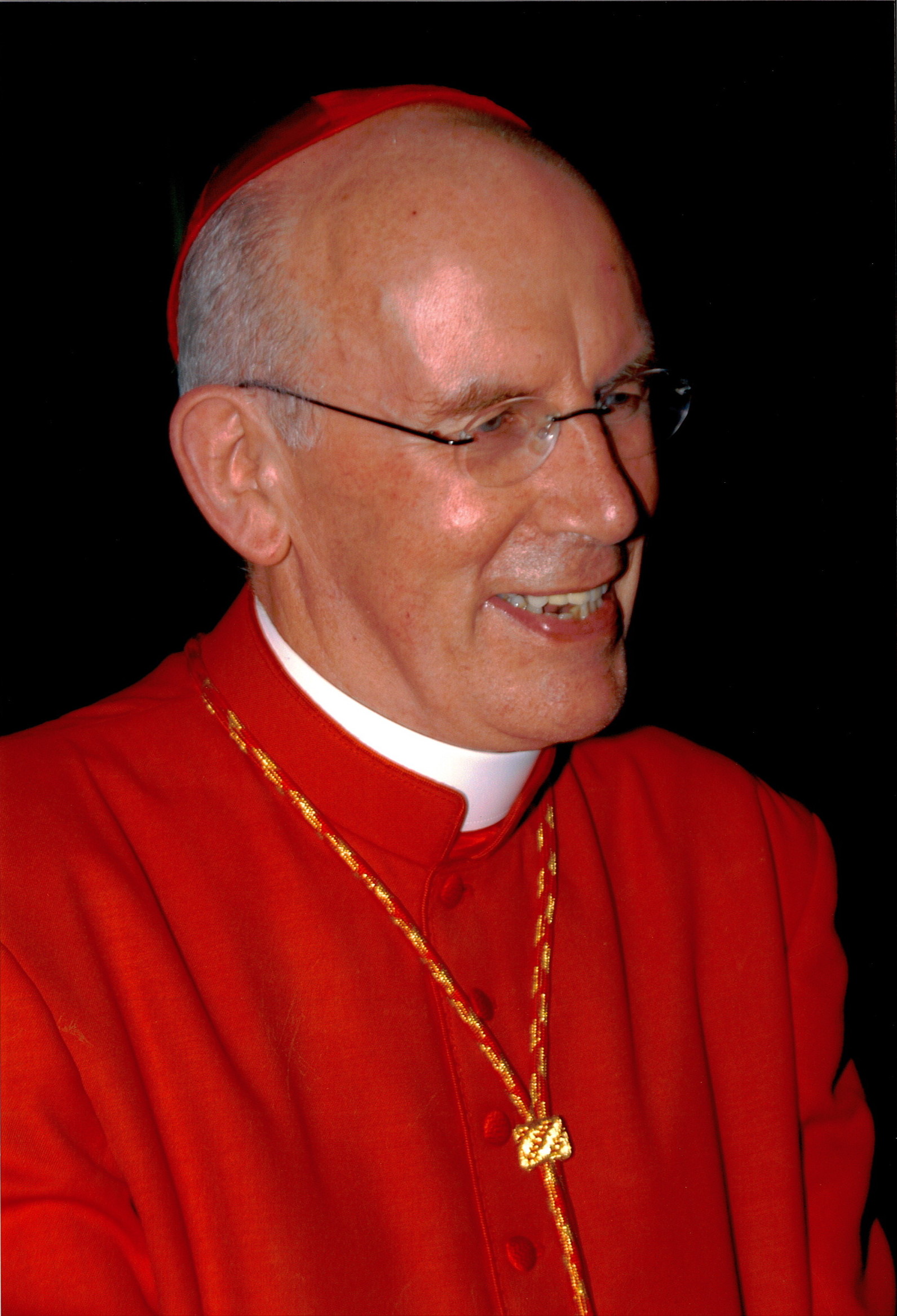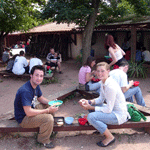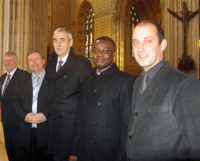Thus our theme this year Catholic Schools – Rooted in Jesus Christ is a key one in reflecting on who we are and what we are trying to do. Catholic schools here set the standards of academic achievement for the whole educational sector. So many of our Catholic schools have a rich cultural programme, both Irish and international. But it takes more than exam results or Irish language and culture to make a school Catholic in Ireland. A Catholic school in this country is not simply recognised by how well it plays Gaelic football, camogie, hurling or the tin whistle. The distinguishing characteristic of the 200,000 Catholic schools worldwide and of the education that they offer to some 52 million students is that they are rooted in Jesus Christ and in his way of looking at the world and at people. What inspires so many wonderful teachers in every country is a conviction that we have an energising vision of life, one that we want to share. If that is not what we are proud to offer, then in Northern Ireland we are merely divisive and potentially sectarian. If we are not clearly rooted in the love of Jesus Christ, then we risk being like a cymbal clashing (1 Cor 13:1) or full of sound and fury, signifying nothing (Macbeth Act 5, scene 5). Research shows that we do so well, not despite the fact of our religious conviction but because of the content and context that that belief system implies. Thus we constantly need to clarify our core vision so that we be the best that we can be.
I would suggest that the biggest challenge facing Catholic education in Northern Ireland 2011 is not transfer from primary to post-primary school, it is not just how we can be more effective and efficient. The biggest challenge in this decade is clarifying the identity of our Catholic schools in the context of a pluralist and reconciled society. Does a school system, explicitly rooted in Jesus Christ actually have a role in the 21st century? If so, what is that role? In that regard I would like to make a few points
Firstly, I have heard many commentators and even Catholic educationalists saying that we have to live with our so-called ‘segregated education’ system because it is a recognition that we have two communities here and that the choices of parents cannot be removed overnight and must be respected. That attitude implies that Catholic schools are merely a relic of a divided past and that they will eventually wither as we become a more mature society there. Sorry! Catholic schools are not a phenomenon that we will get over when we grow up! Access to faith-based education is a key characteristic of a modern, pluralist society. Catholic schools thrive in the most modern and advanced societies. They haven’t withered away when societies make economic progress. They tend to provide better value for the public money that they receive. Indeed, in countries like Lithuania, governments have actually encouraged some state schools to become Catholic because evidence has shown that they can bring in all sorts of human and other resources that the state schools can’t access. In Northern Ireland, the real sign of maturity will not be when everybody just goes to a secular state school, but when diversity of provision is seen as an enrichment for society and not as a threat to its stability. We are not going away!
Secondly, the very forward looking 2001 document Building Peace, Shaping the Future committed all Catholic schools to promote healing in our divided and hurting society. The writers were very aware of the dangers inherent in a system where pupils from a nationalist cultural background tended to attend Catholic schools and where Controlled schools were generally attended by those from a Unionist cultural background. The potential for division in Northern Ireland has been real and has been both exploited and accepted by many. A school system that is rooted in Jesus Christ has to be actively committed to overcoming the many barriers that arise between people on the basis of religion, social class, race and colour. One of my colleagues recently proposed that, after ten years, we need to revisit Building Peace, Shaping the Future and look again to see just how we balance our undoubted right to exist in a pluralist society with our Gospel obligations to promote reconciliation and healing. The constantly uncomfortable Jesus Christ, in whom we claim to be rooted, calls us to serve him and all people and not just ourselves. We are committed to being schools which integrate the community across denominational and social barriers. As we know from an increasing number of our schools which welcome pupils from all faiths and culture, we don’t have to cease being Catholic in order to do build a more shared future.
And I believe that this imperative pushes us to do at least two things.
One of those is something that we are doing already, namely to work increasingly closely with educational leaders in the Protestant churches. And I am not just saying that because we find ourselves in the annual Week of Prayer for Christian Unity. The problem that all churches will face in the future is not one of religious difference but the reality of religious indifference. All our churches have an interest in ensuring that the ideology of secularism does not banish from education any openness to the Transcendent. In an age where children are under enormous pressure to adopt very insubstantial heroes from the saccharine world of light entertainment or the virtual world of war games, we have the common interest of promoting an openness to love, truth and beauty, to community and generosity, to being inspired by good and by God.
The other agenda that we have to promote as well is the right of many people who have no religious convictions to have access to a secular model of education. That, too, is a characteristic of a modern pluralist society and is really not available here – and if we call for rights for ourselves, we have to champion the rights of others. They, like us, are tax payers. As is stated in the Universal Declaration on Human Rights, they, like us, “have a prior right to choose the kind of education that shall be given to their children”.[1][1] Our rootedness in Christ means that we can confidently champion the rights of others as well as those of ourselves.
The third point that I would like to make is the following. We have heard from some political and civic leaders the conviction that – and I quote First Minister Peter Robinson – What I do object to is the State providing and funding church schools. That is a genuinely held view in many quarters. However, I believe that this statement reflects just one more subliminal element of our divided society here. Some different Christian traditions here actually have different ways of looking at the world that we are not even aware of. Thus, I believe that many of those who believe that school should be about education in secular subjects and that all religious input should be handled by churches in their own time, come from a genuinely held belief that is very strongly influenced by one interpretation of the great St Augustine. Taking their starting point from Augustine, they believe that the world is divided into two spheres, the secular and the spiritual. The former is concerned with the here and the latter with the hereafter. Some people believe that this means that there should be a clear divide between things of the world and things of God. The world is studied in school, God is learned about in church.
A Catholic tradition, however, emphasises that the goal of Jesus’ mission was to reconcile all things in Christ (Ephesians 1:10), and not just to escape from the clutches of the fallen world. Thus the Catholic school does not exist just to brainwash pupils with Christian fables alongside ‘real education’ in normal subjects but to provide an integrated view of the world, of culture, of history. The Catholic school tries to take seriously the fact that Jesus took on our human nature – and thus to ensure that by word and deed, “a specific concept of the world, of people and of history is developed and conveyed” [2][2] Or to put it another way “One of the characteristics of a Catholic school is that it interpret and give order to human culture in the light of faith.” [3][3] An education about the Transcendent and the spiritual in human life cannot not be equally concerned with how history, geography, science, music, literature and sport are integrated into the human person’s search for meaning. From a Catholic perspective you cannot separate a secular world that we learn about in school and a religious world that we learn about in church. Young people are living in one world, not in two. We believe that an educational experience that offers this perspective has as much claim to a place in publicly funded education as a school which disingenuously pretends to be neutral on the question of the spiritual.
My fourth point follows on from this and is a counterbalance to it. Nearly three weeks ago, the Irish bishops published Share the Good News – the National Directory for Catechesis in Ireland. That document is clear that, in modern Ireland, religious formation cannot be sub-contracted by families to parishes to the school. While the school is entitled to communicate and to exemplify particular ways of being human, the parish and the family still have the responsibility for catechesis and explicit Christian formation. School, parish and family have complementary but different roles to play in developing an adult faith. We cannot place excessively high expectation on schools and teachers. In many of our schools, there are increasing numbers of young people who are not Catholic or only culturally Catholic. In the school they can experience the Catholic worldview and learn much about that rich world of the imagination which is part of the Catholic identity. But growth in faith and in membership of a faith community needs to be offered in the context of parishes and movements. A GCSE or an A-level in RE is no substitute for conscious formation in the faith, within the family and through the parish. We know already that any limitation of faith formation to what is done through school results in young people happily taking part in what, for many, is the holy equivalent of Disneyworld. Get dressed up, see a guy with funny gear on and have a party! Despite the wonderful work done by schools in Ireland religious practice is now a minority interest. For most young people, the choice is whether to opt into active involvement with religious bodies, not whether to opt out of them. Across modern Ireland, not having any real connection with church is the assumed default position. How we were schools in past is not the model for being a Catholic school in the new environment. Catholic Schools Week is an invitation to acknowledge what schools can do, and to accept what schools alone cannot do. That will entail a revolution in how we are school and parish in the 21st century.
The renewal will be a genuinely Christian one only if we ask ourselves, not just about structure but whether we are we rooted in Jesus Christ. Many people will say that they don’t go to church but that they don’t do harm to anybody, or even that they work for justice and community. But Pope Benedict made a very clear point in his 2005 document Deus Caritas Est. He wrote “Being a Christian is not the result of an ethical choice or a lofty idea, but the encounter with…a person [Jesus Christ] which gives life a new horizon and a definitive direction”[4][4] If we are not rooted in Jesus, then we risk being rootless. People who stand for nothing, easily fall for anything.
Finally, if we are to achieve this, we will have to look at the messages and priorities that we emphasise and how much we are in solidarity with those in need, not just around the world but around the corner. We are one tree, rooted in Jesus Christ, not a series of different and unconnected trees in the same orchard. He is the one vine and we are all branches. Thus, when it comes to finding ways forward, there can be no detached Catholic school for those who live in detached houses, no semi-detached school for those in semis – and lesser provision for those who live in terraces. No school is rooted in Jesus Christ if it is concerned only with its only welfare, its own staff and clientele. The uncomfortable Jesus Christ asks us to see not just the successes of the past or the achievements of the present but his priorities for the future. Subsidiary without solidarity is neither Catholic nor Christian. Being rooted in Christ will place big demands on those who are doing very well at present so that opportunities can be shared and not hoarded, can be developed for all and not just preserved for some.
Conclusion:
Our theme this year offers us a chance to see how explicitly each of our schools is rooted in Jesus Christ. It is not a bind, outdated in modern society. That is our strength and our inspiration. If we continue to turn to those roots in the context and content of our education, we will continue to thrive. If we do root ourselves in him, and seek new growth for new times, we can continue to be a blessing to individuals, families, communities and the wider society. If we do not have those roots, we have nothing to offer to anyone.
Last week, in the tragic events surrounding the death of Michaela McAreavey, we saw the best of what a faith community can do and be, especially in times of challenge and pain. There was immediate access to a wide range of resources to help cope with the awful pain. Our sector will be successful and continue to offer leadership to the wider community if they explicitly champion love, community, reconciliation and concern, especially for those less well off then ourselves. Next week I hope that we can learn from that and re-focus ourselves on being rooted in Jesus Christ.
I am therefore, very happy to encourage schools and parishes to reflect on the theme of Catholic Schools Week 2011. We are not merely relics of the past – but key players in the construction of a healthy and vibrant society where all our young people can flourish.






